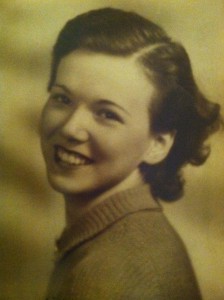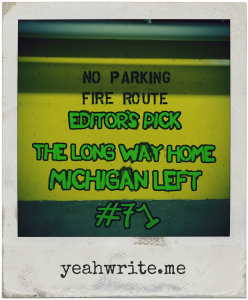I drove the 260-mile trip home to Michigan countless times over 20 years. In the early nineties, just a few months after I moved to Chicago, I brought a nervous new boyfriend home to meet my family. Two years later, we ventured back as an engaged couple, clinking blue-stemmed champagne flutes with my father and stepmother. In another several years, we took our infant son there for Thanksgiving, two overwhelmed first-time parents, cringing as our baby wailed for what seemed like the entire four-and-a-half-hour car ride.
Sometimes, pre-kids, I made the trip home alone and stayed with friends. Post-kids, we went as a family and stayed with my aunt, who had been a mother to me when I was young, or with my dad. We planned our visits around holidays, so they were equal parts stressful and joy-filled. I wanted my husband to help me wrangle our two children, but even more than that I needed the cushion of his emotional support.
I needed it more than ever as we made our latest trek to Michigan, to my cousin’s house in Brighton. Our previous trip there had been to visit my bed-ridden aunt, whose frail, 92-year-old body was unable to bounce back after a bitter bout with pneumonia. She died shortly afterward.
Now, eight months later, we were on our way to her memorial.
On that early Saturday morning in our atypically quiet car, my husband focused on the road, the kids on their iPod games, and me on the prospect of keeping it together in front of my relatives and their friends. This wasn’t a funeral; it was a celebration. It was no place for tears, mine or anyone else’s.
As we passed the exit signs on our journey east on I-94, landmarks we usually pointed out went unnoticed. Not even the Climax, Michigan, sign, which normally elicited a dirty-minded snicker from my husband or me, seemed to register. When we finally reached Brighton, we missed my cousin’s street. I noticed my marker for it — a strangely constructed, half-underground house — but forgot to tell my husband to make the turn. Nothing felt familiar. Everything had changed.
It’s sad and strange to go home when the people you loved the most are no longer there.
I reminded myself that everyone at the memorial had lost my aunt, not just me. When we arrived at my cousin’s house, I forced a smile on my face, hid my sad eyes behind Ray-Bans and headed into the party. My aunt had taught me as a little girl to always say hello to everyone who visited us. So there, at what used to be her home, that’s what I did.
After an hour or so of small talk with relatives and friends, a few of my cousins and I gathered in my aunt’s living room to watch some old videotapes of family parties. My aunt, the matriarch, had dominated our family get-togethers. I felt her presence as we watched the videos, even when she wasn’t on the TV screen.
When dinnertime came, we all felt her presence — in the menu. We dined on the foods she had served at family gatherings: beef brisket, ham, potato salad, cole slaw, cucumber salad and butter tarts. We shared a toast after the meal, each of us raising a shot glass of watered-down scotch with an ice cube in her honor. My aunt had loved her scotch and water — every day at four o’clock and even in her nineties.
The guests departed gradually after the toast, but my husband, children and I stayed well into the evening. We sat in my aunt’s living room with her children, my older cousins, trading stories and catching up on one another’s lives. Their company was familiar, soothing. I didn’t want to go because leaving would mark a conclusion. How could I place a period at the end of the last sentence of such an important chapter of my life?
We did leave eventually, as parents of tired children must. We said our goodbyes and drove up the gravel driveway. That’s the point where I would normally burst into tears after visiting my aunt, sobbing and shaking until at least the end of my cousin’s street. I hated leaving her. I hated being left.
This time I hadn’t cried, which I didn’t realize until we reached our hotel. The memorial had been a good thing, I told my husband. It gave us all closure.
When I woke the next morning, I felt an overwhelming desire to run, fast and far away. I had my closure, and I needed to leave Michigan, my ghost town of memories, and return to my present.
I rose quickly, showered and packed before waking my husband. “I need to leave,” I told him. “Now.” He understood.
We made a quick stop for Coney Island hotdogs — a Detroit-area tradition — on our way out of town. At our table in the diner, I watched my children scarf down pancakes and bacon while my husband and I noshed on our Coneys. My tension ebbed.
The past was painful, but I didn’t have to run from it. I had punctuated the end of my Michigan sentence long ago.
We finished our food and began our 260-mile journey home to Illinois.
***
P.S. My cousin, the talented blogger behind The Three Under, shares her thoughts on the memorial party and growing up in Brighton here.



